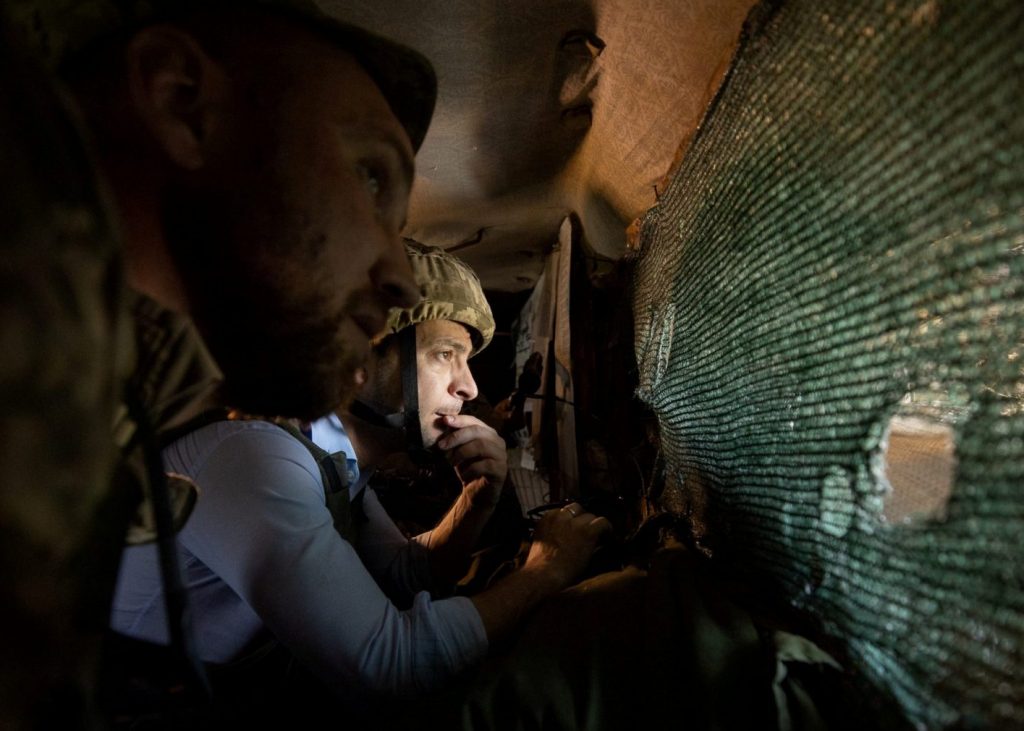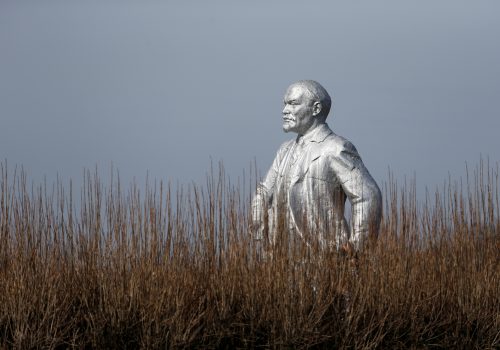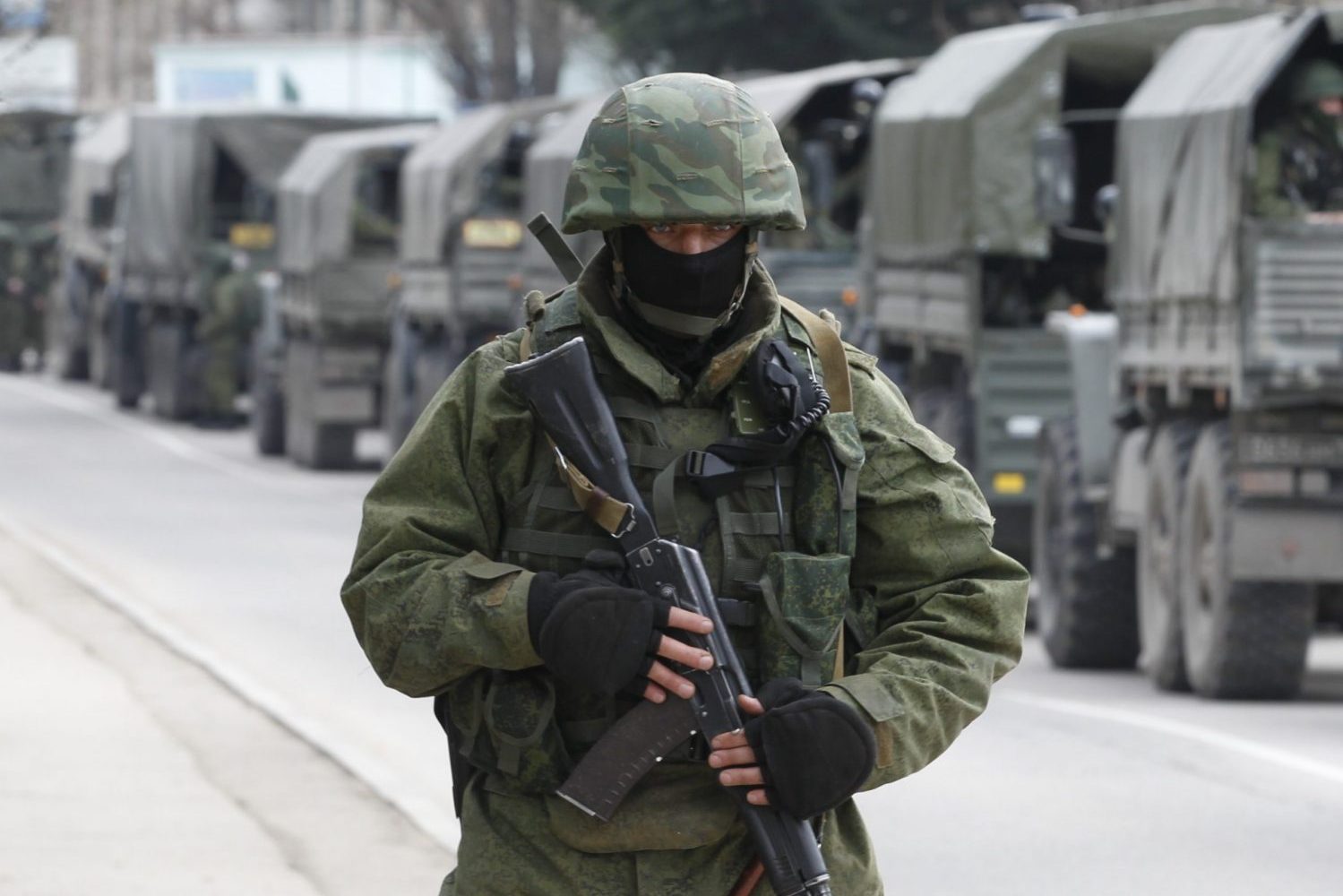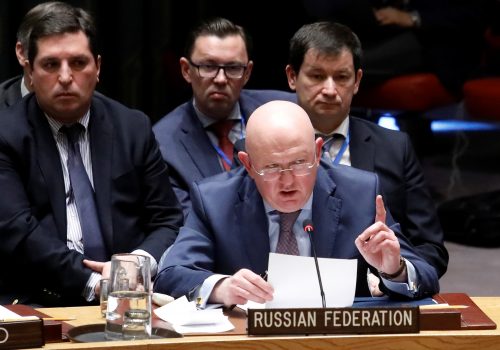Since taking office in May 2019, Ukrainian President Volodymyr Zelenskyy has made ending the country’s ongoing war with Russia his top priority. However, his apparent reluctance to hold Moscow publicly responsible for the conflict risks complicating efforts to secure peace. During the first year of his presidency, Zelenskyy has rarely named Russia as the aggressor, preferring instead to discuss hostilities in abstract terms while dwelling on pre-war stereotypes of a divided Ukraine that tally closely with Kremlin propaganda. This approach is sowing uncertainty within Ukrainian society and encouraging Russia to continue its aggression by convincing Moscow that Ukraine’s Euro-Atlantic integration can still be reversed.
Zelenskyy’s curiously ambiguous approach to Ukraine’s six-year war with Russia was in focus once again last week following the president’s comments on the anniversary of May 2014 clashes in Odesa that left 48 people dead. These tragic events six years ago marked the bloody climax of unsuccessful Russian efforts to seize control of the Ukrainian Black Sea port city. The unrest in Odesa mirrored similar Kremlin-inspired violence in Donetsk, Luhansk, Kharkiv and a host of other major Ukrainian cities as Moscow’s hybrid war unfolded throughout the country’s south and east during spring 2014.
Instead of characterizing the Odesa victims as casualties of a wider conflict initiated by Russia and coordinated from Moscow, Zelenskyy took to social media to pose the provocative question, “Who is to blame?” His comments appeared to make no distinction between Russian aggression and Ukrainians defending their own country. The former head of the Ukrainian Institute of National Memory and current European Solidarity MP Volodymyr Vyatrovych spoke for many when he responded to the president, “If you don’t see Russia as the aggressor then the question “who is to blame?” will always remain unanswered.”
Zelenskyy’s hesitancy to point the finger at Russia does not seem to be shared by the vast majority of MPs from his own party. Around 90% of Zelenskyy’s Servant of the People faction, or 221 of 248 MPs, backed an April 30 parliamentary vote condemning Russia’s annexation of Crimea and continued Russian aggression in eastern Ukraine. Meanwhile, earlier this spring, dozens of Zelenskyy MPs openly rebelled against the president’s plans to begin direct talks with Putin proxies in eastern Ukraine in a move that could potentially have paved the way for Russia to escape responsibility for the war. Nor is the president’s stance in line with Ukrainian public opinion, which clearly recognizes Russia as the aggressor in the ongoing conflict between the two countries.
Stay updated
As the world watches the Russian invasion of Ukraine unfold, UkraineAlert delivers the best Atlantic Council expert insight and analysis on Ukraine twice a week directly to your inbox.
The cautious approach towards Russia displayed by the Ukrainian president cannot be attributed to any weakness in his domestic position. On the contrary, Zelenskyy won record victories in both presidential and parliamentary elections in 2019. He enjoys the most commanding electoral mandate ever secured by a Ukrainian president, while his one-party parliamentary majority is the first of its kind in nearly thirty years of Ukraine’s independent history. This makes his non-confrontational stance on the war with Russia even harder to fathom.
Zelenskyy’s populist political origins may be one reason why he avoids adopting stronger positions on Russia. His ground breaking election campaigns of 2019 revolved around attacks on the discredited Ukrainian political establishment and offered little in the way of concrete policies. Like any good anti-establishment populist, he sought to be all things to all people and positioned his candidacy as a protest vote. This was enough to secure victory in the country’s presidential and parliamentary elections, but it also created entirely unrealistic and often contradictory expectations.
Since taking office, Zelenskyy has sought to maintain his broad popularity by avoiding involvement in controversial and divisive issues such as Ukraine’s post-Soviet memory wars. These long-running arguments over attitudes towards Ukraine’s troubled past are inextricably intertwined with the ongoing Russo-Ukrainian War. Whereas his predecessor Petro Poroshenko championed an unapologetically Ukrainian interpretation of the country’s history that infuriated Soviet loyalists and Kremlin sympathizers, Zelenskyy has chosen to downplay the significance of the entire debate. This aloof approach to Ukraine’s national identity politics was confirmed during Zelenskyy’s landmark New Year 2020 address to the nation, when he famously asked, “What difference does it make?”
The Ukrainian president’s own biography offers hints that might help to explain why he appears unconvinced by Ukraine’s post-Soviet struggle for an independent national identity. Zelenskyy was born and raised in the quintessentially Soviet city of Kryvyi Rih in southern Ukraine, where he grew up amid a Russian-speaking population dominated by the families of industrial workers drawn from across the former USSR. Needless to say, it was not an environment where Ukrainian identity issues were high on the agenda.
After getting his big break in show business in the early 2000s, Zelenskyy went on to achieve huge success throughout the former Soviet Union with his Russian-language comedy vehicles, spending extended periods working in Russia itself and becoming a reasonably well-known member of the Russian showbiz fraternity. Meanwhile, his flagship Kvartal 95 comedy troupe often lampooned Ukrainian national stereotypes in ways that echoed traditional forms of Russian mockery. In cultural and professional terms, Zelenskyy and his inner circle were very much part of the wider “Russian World” that would later become a rallying cry for Putin’s war in Ukraine.
Eurasia Center events

The Ukraine that elected Zelenskyy president in 2019 was very different to the post-Soviet nation of his formative years. However, it remains far from clear whether Zelenskyy himself has fully grasped the scale of the historic changes taking place in the country, particularly in his own home region. Once dominated by pro-Russian and Soviet sympathies, Zelenskyy’s native Dnipropetrovsk Oblast has emerged since 2014 as a bastion of Ukrainian patriotism in the war against Russia. It has provided disproportionately large numbers of military volunteers, soldiers, and medics, while serving as a center for the treatment of wounded troops. Sadly, Dnipropetrovsk has also suffered the highest number of casualties among all Ukrainian regions.
The transformation of Dnipropetrovsk reflects the post-2014 rise of a new and inclusive Ukrainian national identity that transcends the traditionally narrow confines of ethnicity and language. As a result of their contributions to the country’s defense against Russian aggression, Ukraine’s Russian speakers are increasingly regarded as equal members of a civic Ukrainian nation. This historic shift was an essential prerequisite for the 2019 presidential election victory of the Jewish Russian-speaking Zelenskyy. It is therefore somewhat ironic that he still often seems captive to outmoded ideas of a Ukraine divided along linguistic and ancestral lines.
Of course, it is entirely possible that Zelenskyy’s reluctance to publicly name and shame Russia for the war in eastern Ukraine is a deliberate diplomatic ploy designed to provide the Kremlin with a face-saving exit from what is undoubtedly a costly and increasingly unpopular conflict. If so, it has yet to produce results. Moscow may privately welcome Zelenskyy’s less confrontational approach, but there has been no indication over the past year that it will eventually lead to compromises from the Kremlin. Instead, such equivocation only invites further Russian mischief.
Ultimately, if Zelenskyy wants to make good on his election promise of peace, he must abandon euphemisms and confront the causes of the conflict. This means acknowledging uncomfortable truths about the nature of Russia’s fundamentally imperial attitude towards Ukraine and recognizing that there can be no return to the far cosier relationship the two countries enjoyed in the early post-Soviet years. The Ukrainian public is already under no illusions over Russian responsibility for the war. Zelenskyy must now make it clear to Moscow, and to Ukraine’s remaining Kremlin contingent, that the country’s leadership is also united in recognizing and resisting Russian aggression.
Taras Kuzio is a non-resident fellow at the Foreign Policy Institute at Johns Hopkins-SAIS and a professor at the National University of Kyiv Mohyla Academy. He is also author of “Putin’s War Against Ukraine” and co-author of “The Sources of Russia’s Great Power Politics: Ukraine and the Challenge to the European Order”.
Further reading
The views expressed in UkraineAlert are solely those of the authors and do not necessarily reflect the views of the Atlantic Council, its staff, or its supporters.

The Eurasia Center’s mission is to enhance transatlantic cooperation in promoting stability, democratic values and prosperity in Eurasia, from Eastern Europe and Turkey in the West to the Caucasus, Russia and Central Asia in the East.
Follow us on social media
and support our work
Image: Ukrainian President Volodymyr Zelenskyy visits the front line in Luhansk region, eastern Ukraine. May 27, 2019. Ukrainian Presidential Press Service/Handout via REUTERS




